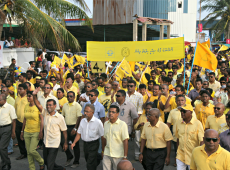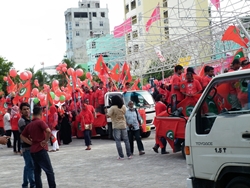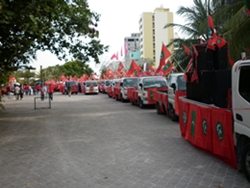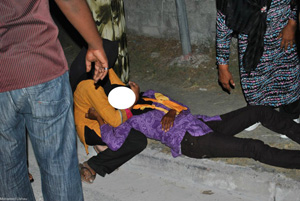This article first appeared on DhivehiSitee’s Election 2013 hub. Republished with permission.
What kind of a country do you want your children to grow up in? What are the values you want them to have? What does it mean to be a citizen of the Maldives? Why would your children be proud to be Maldivian?
As the Maldives prepares for Presidential elections, scheduled for 7 September 2013, political parties promise the population many policies geared to advance social progress and economic growth: more job opportunities, technologically advanced health care services, better access to education, and a reduction in poverty.
At face value they all pledge a promising future. Nonetheless as active citizens, it is important to analyse them in terms of their effectiveness given that the Maldives is a small island developing state and shares many characteristics with other such states: grappling with security issues, both internal security – gang violence, drug use, child sexual abuse – and external – global warming and sea level rise, tsunamis, recession in tourism source countries – and the smallness and remoteness creating high costs associated to goods and services.
From a total population of 330,652 about 43 percent are under 18 years. It is the children of our nation who one day will steer our country into the prosperous, fair and tolerant society we all seek.
For that reason alone, they deserve nothing else but our very best efforts towards a society where they can grow up free from poverty, abuse and fear and with high standards of health, safety and education. While this is a generational task that will keep future Maldivian governments occupied for years to come, it is important in every election to ensure we do not lose sight of this.
An unpublished UNICEF report in 2007 recommended the government to establish a comprehensive social protection system including access to social housing and special assistance for the unemployed in order to prevent a crash in the child protection system.
With the ratification of 2008 constitution, Maldivians (Dhivehin) now have a better understanding of their right to social protection (haqq al-damān ijtimā’ī) and its benefits, mainly credited to efforts of the Maldivian Democratic Party administration with its aim to eliminate of the feudal practice of begging for assistance by the poor.
All political parties cover the Right to Education (haqq al-Ta’līm), the Right to Work (haqq al-‘Amal) and the Right to Social Protection (haqq al-damān ijtimā’ī) in varying levels.
Twenty percent of girls and 11 percent of boys in secondary school have experienced sexual abuse during their childhood as established by a study conducted by UNICEF in 2009. Many of those accessing drug rehabilitation report a history of childhood abuse.
It is evident that in order to tackle drug abuse in the Maldives, it is important to address issues such as child abuse. Child protection is a contentious area where the state has to intervene in the private sphere of the family, often balancing children’s rights and parents’ rights. Even so, to realize the prosperous future we seek, any government should be willing to proactively protect its children and families.
Fundamentally, we should ask ourselves, who would be willing to do this for us? Answers to these questions come through examination of past practices, current atmosphere and pledges.
For a child protection system to be effective and sustainable it needs to be supported by effective legislation and social policy, integrated infrastructures, institutions, therapeutic services, trained professionals such as judges, lawyers, policemen, doctors, teachers and social workers, strategic resource allocation, financial investment, and a well-informed and supportive general public. Research shows that the wealth of a country alone does not achieve effective child protection. Maldives should aim to attain effective child protection through affordable means.
Vaudhu (Pledge)
Jumhooree Party
The Jumhoree Party does not explicitly state that they will provide universal health care insurance but promises that when the allocated amount dedicated to an individual is exhausted the government would cover the shortfall.
It remains unclear if the party intends to reinstate all the benefits introduced during former President Nasheed’s Administration, whether it would be a comprehensive system with universal benefits or whether it would meet the needs of only the most vulnerable. Jumhooree party’s presidential candidate on various public platforms has proved unsuccessful to elaborate on this.
Additionally, the introduction of a holistic tax system (vasha jehi) that will fund social protection and government services leaves individuals unsure of the percentages on income tax that might be levied on them and whether we would be able to accommodate this burden with the rise in costs of living.
In relation to housing, the party asserts that the government will provide housing for every newlywed couple. Apart from this, the party has expressed no other policy relating to housing and hence neglects the majority that already struggle to meet their housing needs.
In Male’, it is usual that one household occupies only one room, so several households reside in a house. This room, or one-household-unit, usually contains a kitchen, toilet facilities and sleeping arrangements. A UNICEF study in 2007 found that that couples that inhabit these households struggled to meet their needs of intimacy especially those with children.
This overcrowding often leads people to take shifts to sleep. This in turn leads adolescents to sleep during the day to let younger children sleep during the night. These adolescents are then sometimes forced to spend time on the streets at night, getting into gang activities and drugs and missing school.
While these are the only two promises pertaining to social protection the party focuses largely on developing the tourism sector by creating opportunities to opening a further 70 resorts where work has been suspended, open three new schools for Hotel and Catering, to “make millionaires into billionaires”, and to build an international Transhipment Port on Kulhudhufushi [Island in Kaafu Atoll].
While these goals are important and aspirational, more than half the population continue to live below the poverty line preventing them from accessing appropriate healthcare, education and employment opportunities.
The party proposes to increase job opportunities for the indigenous population with the aim of reducing the expat population. However, how this is going to be achieved has not been explained yet.
In relation to market opportunities for local products the Jumhooree party promises to increase the production of fish canning with 100 fishing boats a year to match the increased production. The party proposes to offer short and long term farming courses but does not express how they intend to create job opportunities in this area.
Overall, the policies of Jumhooree party does not outline an extensive social policy and risk that the gap between the rich and the poor will increase further and fail to reach those that require social protection.
Progressive Party of the Maldives (PPM)
PPM offers a number of social protection measures that are child focused: a mechanism for supporting single mothers with childcare subsidies, acquiring the rightful share of assets that was attained during the marriage in occasion of divorce, create Internet-based work for women to assist them to work from home, establish a system by which persons with disabilities and the elderly can lead a life without discrimination and have equal access to services.
While, it is important to create opportunities for Internet-based work at home this excludes the majority of women living in the rural areas of the Maldives without easy access to modern computers. PPM has not announced any policy addressing opportunities for rural women.
Additionally, the party asserts their objective to bridge the gap between the urban centre Male’ and the rural Maldives by establishing services that are at the same level as Male’ in all the islands. This is a policy that aims at equality, however its feasibility and how this is going to be achieved remains to be communicated.
Although a newly registered party, most of PPM’s policy makers belong to President Maumoon Abdul Gayoom’s administration responsible for 30 years before losing the election in 2008. Despite a number of economic and social advancements during these 30 years, the gap between the rich and poor, urban and rural populations widened. Many relied on handouts from the wealthy or writing directly to the President if they required traveling abroad for health.
PPM’s policies promise to further women’s rights, but lack a commitment to investigate the systematic torture documented by the Human Rights Agency REDRESS in 2012. Without taking necessary action against the aggressors the new promises lack credibility. Further its leadership had proved lethargic in advancement of the social protection system at the helm of power and this casts a very reasonable doubt in its ability to fulfill it now.
PPM asserts that they will establish extra security and protective mechanisms for the police force and the military, which suggests an increase in the defense and police budget. Research has shown that increased defense spending often leads to lower levels of child protection.
Maldivian Democratic Party (MDP)
Awareness among the population about the benefits of social policies grew during the 3 years of President Nasheed’s administration when a strong emphasis was laid on social protection with a total budget allocation of MVR 1,250,203,404 (US$81 million) in 2011 alone. This spending in the social sector was the highest recorded in Maldivian history (Statistical Yearbook 2010).
This protection extends to protection of children in general. The budget included welfare assistance, a national health insurance, single foster parent allowances as well as several subsidies for housing.
MDP’s objective is to reduce the gap between the “haves” and the “have nots”. In a 2010 survey, “Assessment of the Elderly receiving “Madana” and the Pension”, 73 percent of the elderly reported that their relationship with their children had improved as they can take care of their own needs and some reported having assisted to setting up savings account for their grandchildren, while also indirectly improving children’s lives.
MDP along with PPM has has expressed intentions to reform the judiciary. However, MDP is the only party that provides specific plans how to achieve this. The judiciary plays a crucial role because judgements that pertain to children can work in the best interests of the child or against it. The International Commission of Jurists (ICJ) in 2011 found breaches of the separation of powers – executive, legislative and judiciary.
Islamic law lays importance on making the judiciary accountable for its conduct. Neglecting this office therefore places the “body of Muslims in a state of sin, as they are enjoined to support this office, or to support those who endeavour to maintain it.”[1] Islamic law also emphasises the honesty and piety of judges.[2]
The youth policy of the MDP focuses on engaging with the whole youth population without discrimination. It covers various aspects of cultural and artistic life, which is crucial for increasing the connection to the culture of the Maldives that has made us unique. It also encourages a sense of inclusiveness and ensures that academically ‘weak’ children and youth are not marginalized and form an integral part of society.
In its Right to Work policy, the party proposes a right to fair wages, a right to employment, work and accident liability for loss, a right to fair work regime and leisure. This promotes equality and tolerance.
The housing policy introduced between 2008 and 2012 has instilled the importance of working towards owning ones own property. It encourages citizens to take responsibility for their own future and to build their family. For those who are unable to afford housing, subsidies were offered to reach a point that made it possible to buy. It creates opportunity for those individual who do not have the possibility to inherit land. Provisions for those who are most vulnerable through the social housing policy have further strengthened this policy.
MDP’s policy on strengthening family ties is central to children’s rights and child protection. This policy ensures that government efforts were not only concentrated on tertiary interventions (protection from abuse) but building families and preventing breakdown.
Prior to Nasheed’s administration children were removed from their families prematurely and placed in residential state care facilities. This practice increased incidences where parents gave up on children too quickly, deprived them of their right to grow up in a family environment and at the same time increased state spending.
MDP had put in many measures to reduce removing children prematurely by increasing social work assistance and providing social protection benefits. Valuing the family unit is fundamental in Islamic law and hence this policy not only mirrored our religious values but strengthened the right to a healthy family environment as afforded by the UN Convention on the Rights of the Child. Even taking into consideration these policies, there is still a long way to go. Yet it is safe to assume that the path is right.
Waheed coalition
The coalition government has been characterized by widespread, systematic and institutionalized brutality. The level of mass aggression by the state party in recent history of Maldives has never been as severe as today. Many women and men suffered direct physical and sexual assaults. Testimonies from many victims have been documented and presented to the International Covenant on Civil and Political Rights (ICCPR) Committee in 2012.
Neither the state structures nor the Human Rights Commission have acknowledged the brutality or taken steps against those responsible; instead many police officers were rewarded with promotions and extra benefits. Children internalising the violence from the state party perpetrated on innocent civilians by those who are meant to protect them have caused long-lasting psychological damage.
Additionally, the Coalition government has discontinued social protection benefits that were established by President Nasheed. The government also proposed a 14 percent increase in the defense budget in 2012. All these factors are not conducive to effective child protection.
It is maybe for these reasons that the Coalition’s promises present a confusing mixture of social protection policies. What is most concerning, as far as children are concerned, is the promise to establish three extra shelters for children and for women who suffer domestic violence.
Family and Child Protection Services receive on average seven cases per week on issues relating to minor family conflict, behavioural issues or various forms of abuse. Most cases are not considered in the extreme categories requiring immediate removal of children into State care. Even if cases that require removal into state care, it is in child’s best interest to reintegrate them with a family as soon as possible.
On 17 August 2013, The Economist, in its article “Children’s Homes – The Nanny State” published figures around the world illustrating that institutions are being closed and family-based care is being favoured. This global movement is due to the fact that children who grow up in institutions are far more likely to offend, end up in prisons, develop adjustment issues and so on.
The Maldives does not need more institutions, especially with limited experience and services in place for resocialisation back into the community. This policy alone outweighs the other policies as this policy assumes that more and more children need to be institutionalised and there will be an increase in women being abused. There is no attention on preventing such incidences.
Conclusions
The above discussions show that the Jumhooree Party focuses largely on economic gains, PPM focuses on conservative provisions of welfare where individuals continue relying on the government, Coalition government believes that there will be an increase in children requiring institutional care, and MDP emphasises balance of economic growth and social protection. It is advisable that all parties would benefit from developing policies relating to mental health, as currently the systems in place are grossly insufficient.
The increasing budget deficit has been a struggle for the Maldives. The Majlis Budget Committee estimated the Maldives budget to reach 27% of the GDP by the end of 2012. In response, the International Monetary Fund (IMF) has warned that the country ‘risks running out of reserves and miring the country in poverty.’[3] Therefore to bring about the change we seek, we need to start looking at the evidence on the ground.
Most parties, apart from MDP, from the policies announced, have promised policies without considering the already existing deficit. What we need is a sustainable mechanism through existing means to fill the void. Not aspirational pledges that risk debilitating the state. Although every individual wants the future to be prosperous, fanciful pledges or going into further debt is not what the population deserves. The society and its children deserve to be built on constructive, not destructive, policies and pledges. We need to start acting upon a code of ethics that benefit the larger social needs, relationships and groups rather than one based on individual needs and relationships.
It is time that we take the moral step of progress and set the good of many before the interests of the few and be concerned for the welfare of the community without hope of an individual return.
Dr Mariya Ali is a former Deputy Minister of Health and Family, with a 20 year background in child welfare in the Maldives
All comment pieces are the sole view of the author and do not reflect the editorial policy of Minivan News. If you would like to write an opinion piece, please send proposals to [email protected]
[1] El-Shafi, H. A. L., (2003), “Judicial Training in Islamic Jurisprudence”, in Haleem, A. M., Sherif, O. A., & Daniels, K., (Eds) (2003), Criminal Justice in Islam: Judicial Procedure in Sharia, I.B.Tauris, p. 168
[2] ICJ, supra note 19, p. 169; Velezinee, A., (2012), Constitution Breach by the Judicial Service Commission, Hijack of the Judiciary, and link to 7 February 2012 Coup d’ etat.
[3]Bosley, D., (7th May 2012), “IMF predicts dire consequences if deficit reduction fails”, Minivan News.
Likes (0)Dislikes
(0)Dislikes (0)
(0)  Jovial supporters in their thousands danced, cheered, and even ran their way along Male’s thoroughfares. Participants of the march surpassed MDP’s eighth anniversary parade, with people packed the entire length and width of Majeedhee Magu, Male’s nearly two kilometre-long thoroughfare.
Jovial supporters in their thousands danced, cheered, and even ran their way along Male’s thoroughfares. Participants of the march surpassed MDP’s eighth anniversary parade, with people packed the entire length and width of Majeedhee Magu, Male’s nearly two kilometre-long thoroughfare. Ishan.
Ishan. The march ended on a high note after circling around the capital to end back at the Tsunami Monument with Nasheed addressing thousands of his enthusiastic supporters.
The march ended on a high note after circling around the capital to end back at the Tsunami Monument with Nasheed addressing thousands of his enthusiastic supporters.

 “In the past 18 months, I have slept in 343 different beds. We have visited all the islands of Maldives. We have met with many Maldivian citizens. We know the sentiments of the Maldivian people. We have stepped forward to make the dreams of the Maldivian people a reality. We will win this election in the first round, in a single round,” he said, prompting loud applause from the crowd.
“In the past 18 months, I have slept in 343 different beds. We have visited all the islands of Maldives. We have met with many Maldivian citizens. We know the sentiments of the Maldivian people. We have stepped forward to make the dreams of the Maldivian people a reality. We will win this election in the first round, in a single round,” he said, prompting loud applause from the crowd.
